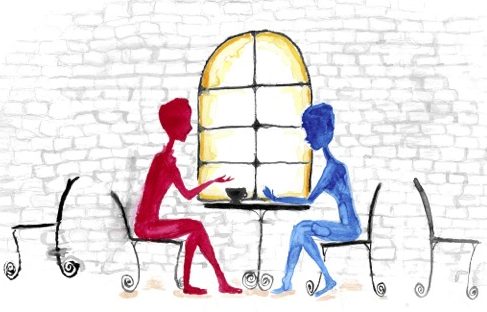OPINION: Dealing with brick-people in the age of Andrew Tate
February 5, 2023
Growing up, my uncle always told me, “the average person is as bright as a brick.” Many years later, I realized how right he was.
In our media-centric era, it’s vitally necessary to sift through the mountains of concerning opinions and misinformation, but picking out the seeds of wisdom from the oceans of ignorance rarely feels worthwhile. Woefully, it’s an experience that’s barely satisfying enough to suck me back in everyday. This onslaught of raw information is overwhelming, though contending with it is a skill that can be developed with practice.
Some people aren’t ignorant because they lack knowledge, but lack an ability to manage an overabundance of it. These are the very same people my uncle warned me about—the brick-people. Some draw conclusions that either don’t exist or shouldn’t. This type of brick-person is the white lives matter supporter that opens up their blatantly biased crime-rate statistics whenever someone mentions the police. But the scariest type of brick-person doesn’t draw any conclusions at all. They steal them from others.
A few weeks ago, I stepped into what I didn’t know was a battlefield with landmines scattered across the landscape—a night out drinking with some old friends.
As the designated driver, my sobriety was a priority, but I couldn’t keep my twenty-one year old guest from following my lead. It started with a single shot of rum. Then it became two. Then a third followed. And before any of us knew it, our conversation devolved into hours of life advice including to stop showing so many weak emotions, never eat more than one meal a day, and my favorite, drop out of school so you can be more like me.
I was blindsided. I was embarrassed. And, much like my mother when she saw my 7th grade report card, I was disappointed. To my relief, my other friends thought his drunken rants were entertaining. One of them found his talking points familiar and jokingly asked, “do you watch Andrew Tate podcasts?”
We shouldn’t have asked that. He brandished a drunken smile, vacuumed in the surrounding air, and began another round of rants.
Andrew Tate is a British-American influencer made famous not for his four-time boxing world championships, but for his podcasts, interviews, and, more recently, human trafficking accusations. Much more recently, he was detained in Romania after leaking his location in a tweet in an attempt to antagonize a 19-year old activist.
My friend followed him, as well as similar influencers, religiously. His rants danced from topic to topic with no clear direction. First, he complained that modern men are too soft. They don’t have the strength and composure that idols of masculinity like Andrew Tate have. Both he and Andrew Tate hate watching men cry. Emotions interfere with productivity, so they believe men would be better off without them.
Second, he boldly suggested that more people be traumatized. Trauma builds character, after all. To prove his point, he cited the success of Oprah Winfrey, a woman who was regularly physically abused by her parents and grandparents. This claim was a lot harder for me to digest. In fact, his lack of empathy made me want to throw up. I mentioned all the people with lives ruined by their trauma. I explained how they were torn apart both mentally and physically by their experiences.
To finish our night, we had a long chat about the connective tissue between people like Andrew Tate and his other idols like Jordan Peterson. I had long since stopped arguing with him. It was around this time that I started laughing alongside my other friends. I questioned why I couldn’t hold the same authority that the prestigious Mr. Tate seemed to have. It could’ve been my full head of hair, or perhaps my ability to speak without rushing through my sentences, or possibly my failure to invest in a wall of firearms I will never have a practical use for. Nevertheless, I realized he wouldn’t listen to me, shrugged my shoulders, and finally started to enjoy the show.
Every now and again, we calmly attempted to remind him that Tate was a problematic figure. And each time, he reassured us, “I don’t agree with everything he says. I don’t think women should be doormats like him.” As much as I want to praise him for this, it isn’t exceptional. This is a standard, and the only standard he’s met.
Information is dangerous. It turns us against each other; it causes wars and insurrections. But it’s also the cure. Staying informed lets us craft our own opinions, it keeps us from giving a platform to hate, and it brings us together.







